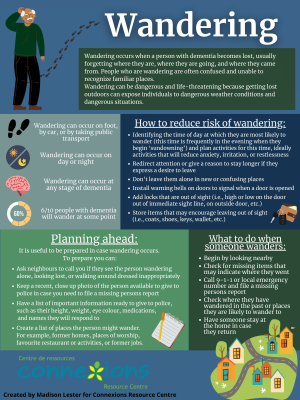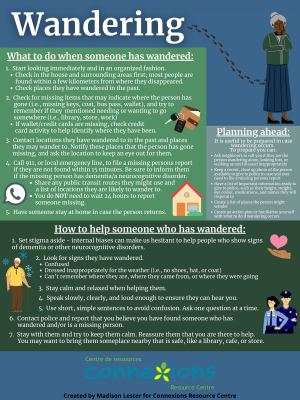Wandering
Wandering occurs when a person with dementia becomes lost, usually forgetting where they are, where they are going, and where they came from. People who are wandering are often confused and unable to recognize familiar places.
Wandering can be dangerous and life-threatening because getting lost outdoors can expose individuals to dangerous weather conditions and dangerous situations.
Wandering can occur:
- On foot, by car or by public transportation.
- Day or night.
- At any stage of dementia
- 6/10 people with dementia will wander at least once.
How to Reduce the Risk of Wandering
- Identifying the time of day at which they are most likely to wander and plan activities for this time.
- Redirect attention if they express a desire to leave.
- Install warning bells on doors.
- Add locks that are out of sight.
- Store items that may encourage leaving (keys, wallets, coats, shoes, etc.)
Planning Ahead
It is useful to be prepared in case wandering occurs. To prepare you can:
- Ask neighbours to call you if they see the person wandering alone.
- Keep a recent picture of the person in case you need to file a missing persons report.
- Have a list of important information ready to give to the police (ex: height, eye colour, medications, etc.).
What to do When Someone Wanders
- Begin looking nearby.
- Check for missing items that may indicate where they went.
- Call 911 or a local emergency and file a missing persons report.
- Check where they are likely to wander to.
- Have someone stay stay at home in case they return.
Take a look at two amazing infographics on Wandering made by Madison, a student at the University of Ottawa and Connexions volunteer!
How to Help Someone Who is Wandering
- Set stigma aside – internal biases can make use hesitant to help people who show signs of a neurocognitive disorders.
- Look for signs that they have wandered (confused, missing clothing item such as a coat or shoes, cannot remember their surroundings).
- Stay calm when helping them.
- Speak clearly and loud enough to ensure they can hear you.
- Use short and simple sentences to avoid confusion.
- Contact the police if you believe the person has wondered or is a missing person.
- Reassure them that you are there to help. You may want to bring somewhere nearby that is safe, like a café or library.

Connexions Resource Centre promotes the health, social wellbeing and vitality of the English-speaking community through empowerment, participation and collaboration within the Outaouais.
Main Office:
Satellite Offices:
Shawville: 530, rue Main, Shawville, Qc, J0X 2Y0
Wakefield: 721, chemin Riverside, Wakefield, QC J0X 3G0



